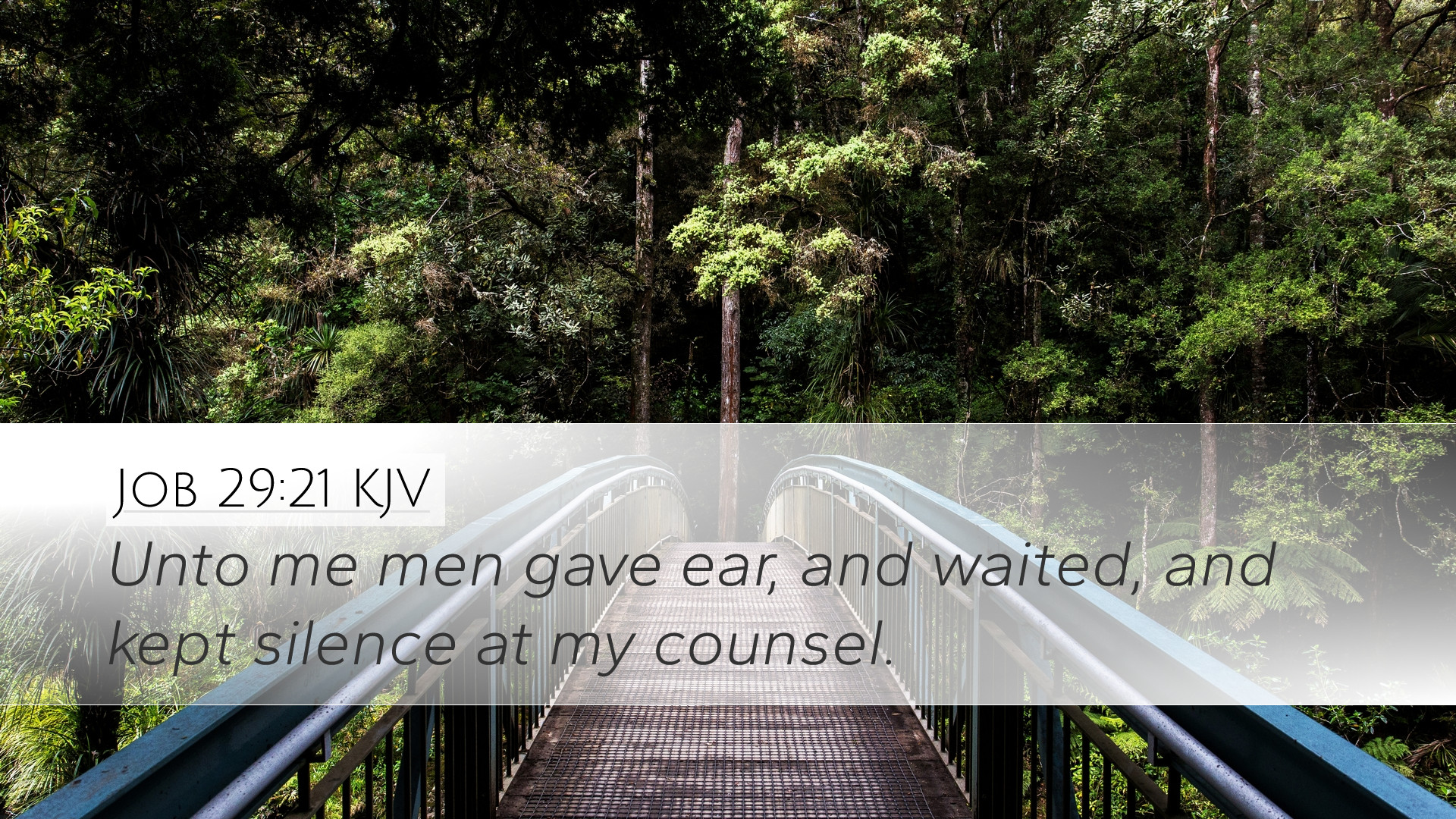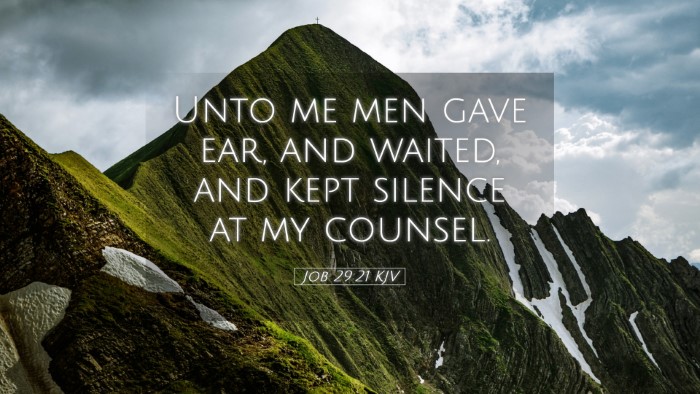Old Testament
Genesis Exodus Leviticus Numbers Deuteronomy Joshua Judges Ruth 1 Samuel 2 Samuel 1 Kings 2 Kings 1 Chronicles 2 Chronicles Ezra Nehemiah Esther Job Psalms Proverbs Ecclesiastes Song of Solomon Isaiah Jeremiah Lamentations Ezekiel Daniel Hosea Joel Amos Obadiah Jonah Micah Nahum Habakkuk Zephaniah Haggai Zechariah MalachiJob 29:21
Job 29:21 KJV
Unto me men gave ear, and waited, and kept silence at my counsel.
Job 29:21 Bible Commentary
Commentary on Job 29:21
Job 29:21 states, "To me, men gave ear and waited, and kept silence at my counsel." This verse rests in the broader context of Job's lament, where he reflects on the time when he was esteemed and held in high regard by his peers. The insights drawn from significant public domain commentaries shed light on Job's experience and the underlying themes present in this passage.
Contextual Overview
Job, a man who once enjoyed prosperity, now finds himself in deep suffering and isolation. The verses that surround 29:21 showcase Job's reminiscence of his past glory and the respect afforded to him by society. This nostalgic reflection provides a basis for understanding Job's feelings of loss and abandonment.
Insights from Matthew Henry
Matthew Henry notes that in his former state, Job commanded the attention of the community.
- Respect and Leadership: Job was not only a figure of wealth but also one of wisdom. People would gather around him to hear his counsel. This highlights the role of wise leadership in society.
- Desire for Attention: The phrase "gave ear and waited" illustrates the eagerness and expectation of the people that Job would provide guidance. This underlines a clear contrast to his current state of neglect.
- Silence in Awe: The silence mentioned suggests a reverence that indicates how Job's words were once impactful and shaped the community's directions and decisions.
Insights from Albert Barnes
Albert Barnes provides a deeper exploration of the verse regarding the nature of mutual respect and the attributes of good counsel.
- Human Communication: Barnes emphasizes the importance of attentive listening in effective communication. Job's past ability to command attention illustrates the natural human inclination to seek wisdom.
- Counsel Bestowed: The mention of counsel indicates Job's role as a mentor or leader where the community relied on him not just for material but for spiritual and ethical guidance.
- Contrast with Current Reality: This comparison between past and present serves to amplify Job's sense of loss and enhances understanding of the spiritual desolation he experiences through his trials.
Insights from Adam Clarke
Adam Clarke analyzes Job 29:21 with an emphasis on job's expression of sorrow and his acknowledgment of social dynamics.
- Human Relationships: Clarke remarks that Job’s prior influence over others signifies the relational aspect of human existence where community involvement and shared wisdom play a crucial role.
- Social Commentary: This verse draws attention to the societal expectation of respect for wisdom and experience, indicating that communities thrive on the input of seasoned figures like Job.
- Job’s Despair: Clarke encapsulates the depth of Job's despair as he now contrasts these social highlights with his current afflictions where he no longer receives the same reverence.
Theological Reflections
The reflections provided by these commentators reveal several theological insights pertinent to both individual and communal faith dynamics:
- Suffering and Identity: Job’s identity was intricately tied to his status as a respected leader. This reflects a deeper truth that our human identity often interweaves with societal roles and expectations.
- The Call to Wisdom: The eagerness of people to hear Job demonstrates the innate human pursuit of wisdom and understanding, urging both pastors and scholars to seek avenues to provide godly counsel today.
- Redemptive Relationships: Job's past standing serves as a reminder of the importance of cultivating redemptive relationships within the community. This theological significance demonstrates that all are called to be both teachers and learners in the body of Christ.
Conclusion
Job 29:21 serves as a poignant reminder of both the highs and lows of human experience. As Job reflects on a time of respect and influence, we are invited to contemplate how our own actions and counsel affect those around us. The insights drawn from notable commentaries enrich our understanding, providing depth to the themes of suffering, identity, and the profound nature of wisdom in community.


